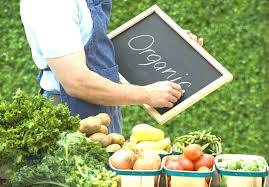Ukrainian Organic and Dairy Products to Appear at SIAL PARIS

From October 19 to 24, 11 Ukrainian producers of organic and dairy products will be showcased this year with the support of Switzerland at the National Stand of Ukraine at the international exhibition SIAL PARIS 2024. This will be the first time within the framework of the Swiss-Ukrainian program "Trade Development with Higher Added Value in the Organic and Dairy Sectors of Ukraine" (QFTP). According to Swiss partners, the participation of Ukrainian enterprises aims to promote Ukrainian products in international markets.
International experts and business representatives will familiarize themselves with Ukrainian organic products certified according to the high standards of organic regulation in the European Union. Ukraine will be represented at the event by "Halex-Agro" (Zhytomyr region, producer of grains and honey), "Catanzaro Eurasia" (producer of berries and juices from Odesa region), "Organic Milk" (Zhytomyr region, dairy products), "Stodola" (Mykolaiv region, vegetables and preserves), "Helsi Generation" (Dnipropetrovsk region, producer of grains, flakes, flour, and amaranth oil), and "Chemex LTD" (Kyiv region, producer of cereals, grains, and flakes). Additionally, dairy producers will present their products at the event. Their facilities are included in the relevant list of verified facilities authorized to export to EU countries. This list includes "Dubnomoloko" (Rivne region), "Galichina Dairy Company" (Lviv region), "Pervomaisk Dairy and Canning Plant" (Mykolaiv region), "Prime Snack" (Transcarpathian region), and "Khorol Baby Food Plant" (Poltava region).
It should be noted that Ukraine ranked 5th out of 125 countries in terms of volumes of exported organic products to the EU in 2023 and has remained in the top 5 largest exporters to the EU for the sixth consecutive year. Specifically, during 2023, 2.48 million tons of organic agricultural products were imported into the European Union. Moreover, the EU remains the main importer of raw materials and primary production products. It is important to mention that the country of origin and knowledge of labeling influence consumer choice, but there is a greater trust primarily in domestically produced goods. The EU organic logo, which is backed by certification, positively affects consumer choice.
At the same time, the image of the exporting country is essential for imported products. This is reflected in the results of a study conducted in Hungary and Poland, the main purpose of which was to examine various product characteristics related to trust in organic food products. According to analysts from the “Organicinfo” project, the organic market in Hungary is currently valued at 30 million euros (0.3% of the total food market), with an average per capita consumption of organic products amounting to 3 euros per year. The organic market in Poland is valued at 314 million euros (0.6% of the total market), with annual consumption at 8 euros per person. Interestingly, it is noted that packaging plays a decisive role when choosing organic products. Paper packaging evokes the most trust, as consumers perceive it to be the most natural. The concept of "unpackaged products," which is gaining popularity among environmentally conscious consumers, offers a higher level of trust than plastic but is still lower than that of paper. Meanwhile, price plays a paradoxical role in shaping trust in organic food products. Although price is important when purchasing organic products, and consumers seek lower-priced items, a low price for organic goods can deter them and provoke a certain level of skepticism.
 Found a mistake on the site? Tell us:
Found a mistake on the site? Tell us:

 Telegram
Telegram